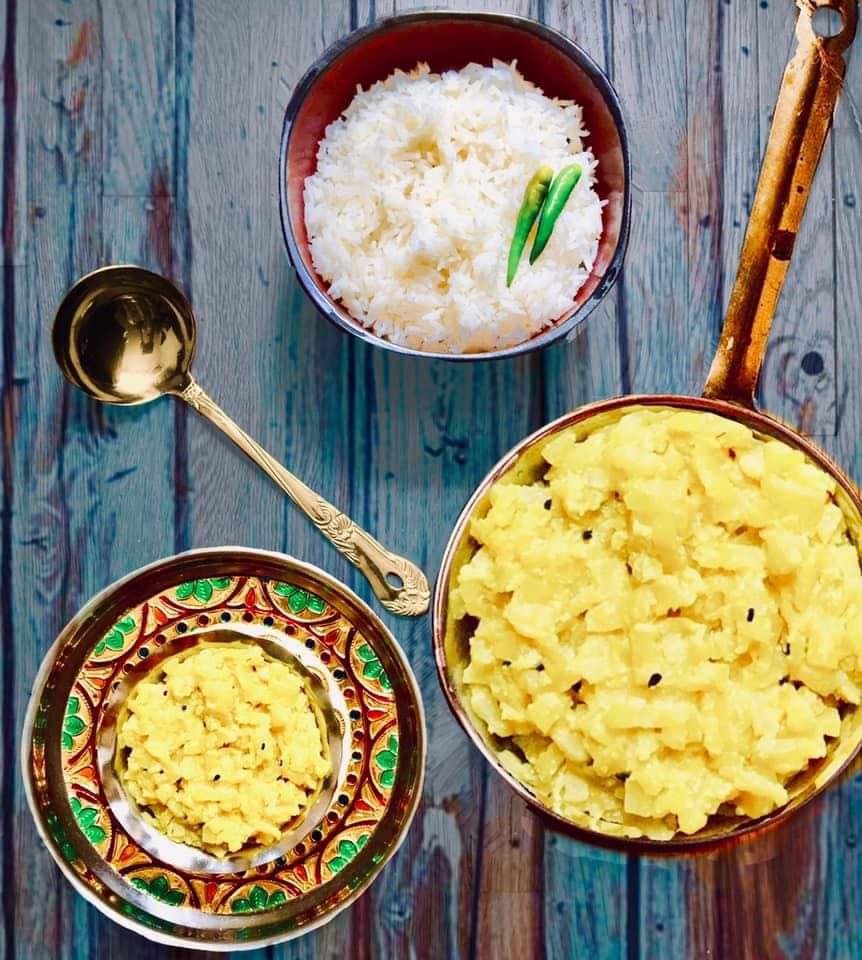Translated from the Bengali by Upama Mukherjee
Beshwari : White gourd made with mustard paste
Before Baba got transferred to the city, we used to live in a house that was unseparated and had one common courtyard and one kiln.
The rooms surrounding the large courtyard were yet to be claimed as ‘ours’ and ‘theirs’.
Boro Ghor, Thakuma’s room, was where most of our domestic chatter, all the shouting, gossiping, discussion, and consultation would take place through the day till bedtime set in.
The doors and those large windows of the room were adorned with beautiful wooden carvings on their panes and frames. The windows did not have bars.
As for me, those unbarred windows became my doorway in and out.
Thakuma’s day started before sun rays could reach the ground.
A pair of white orchids and rosebays stood at the outhouse. I followed her with a woven straw saaji—”O Thakuma, here’s one flower,” or “Don’t miss that one over there,” or “No red ones for you today.”
Carefully picking up all the flowers I showed her, she placed them into my flower basket and said, “Chaitanya Thakur loves the white ones.”
By the time she was done with the flowers, cleaned the house, took a bath, and painted tilak on her nose and forehead, the soft rays of the sun gently touched the top of the guava tree.
I waited for her puja to end. Meanwhile, Maa and my aunts would have started arrangements in the kitchen after they were finished with their morning rituals and bath.
“Moni, time to study,” Maa called out from the middle of all this. But how could I start without having batasha prasad? If I touched the books, I had to wash my hands again before taking the prasad. So I used to keep my hands washed before and planted myself behind my grandmother, “She is not yet done with puja, Maa.”
By then the chime of Thakuma‘s bell was accompanied by grandfather’s radio beginning to sing, “Jat gelo, jat gelo bole, eki ajob karkhana…“
And like that, the soft murmurs of the morning broke into an ascending hullabaloo. Some had to leave for college, some had an office to go to. The daily skit at the water well was almost over too.
But the kitchen fire was still not lit. Thakuma would finish the remaining rituals hurriedly. Finally, she would hand me two pieces of batasha and a tulsi leaf and say, “Bow down before you eat.” After that, she would not wait and head straight to the kitchen taking an aluminum pot from the upper-story room with rice filled in it. I nibbled at the batasha slowly in the fear of it running out fast.
Tea was the first thing in the kitchen to be made. Before everyone finished the tea with muri and murki, boiling rice bubbled and brimmed at the edge of the pot. Thakuma removed the lid and went to the vegetable garden at the corner of her room and the kitchen. Sitting near grandpa in Thakuma’s room, I parroted, “Pakhi shob kore rob, Rati pohailo…“ while keeping an eye on the window. I watched her pick up the green white ash gourds from the loft. Beshwari was to be prepared with that gourd.
As she chopped the gourd, drained the starch of the cooked rice, and tilted it upside down as was the way to get all the water out of the rice and keep the grains fluffy, I finished reading and reached the kitchen with grandpa’s empty tea cup.
She placed an iron pan on the kilt, and handed me her portion of the puffed rice, “Have this, today’s morning hours passed in lunch arrangements.”
I used to pick the sweetened rice crispies from the bowl, watching the mustard oil steaming just after it was poured into the heated pan. Tampering the oil with nigella and green chilies, she added the chopped gourd and sauteed it a bit before covering the whole thing. While that pot cooked, she turned the pot of rice back up and wiped its sides with a piece of cloth. Maa on the other side made a paste of mustard, green chilies, and salt on the pestle. Granny would say: “Curry doesn’t taste right unless the mustard is done as smooth as sandalwood paste.”
Then she lifted the lid to add the salt and a little sprinkle of turmeric powder. She always used less turmeric in anything made with mustard paste. Then she sauteed it some more and covered it again. By then, Maa would have finished with the mustard too. Thakuma arranged brass plates in rows to serve the rice.
She knew from the wafting steam coming out through the gap in the lid when it was time to take it off. And add the mustard pasted fine as sandal to the ash gourd. Then in quick succession, she sprinkled a little sugar, sauteed it, and took it down.
Beshwari was served with steaming hot rice in the rows of brass plates placed on the kitchen balcony, and the clock that my uncle sent from Russia chimed eight o’clock in the morning.
The above is an excerpt from Smriti Bhadra’s book Roshui Ghorer Royak (Days In The Kitchen), first published in 2021. The book is a collection of eclectic recipes from the author’s bygone days. Not merely a book of recipes with meticulous instructions and information, it presents itself as a food memoir wherein the author reminisces about her life through myriad food items that are intrinsically entwined with her cultural identity. This is the fourth part of the series of the translated book. To read the first, second, and third parts, click on the following links:
To read the following fifth and sixth parts, click on the following links:
Also, read an Assamese story by Anuradha Sharma Pujari, translated into English by Harsita Hiya, and published in The Antonym:
Follow The Antonym’s Facebook page and Instagram account for more content and exciting updates.




























0 Comments